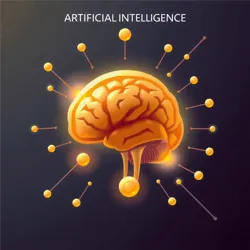Artificial Intelligence

Artificial Intelligence (AI) refers to the simulation of human intelligence processes by machines, especially computer systems. These processes involve learning, reasoning, problem-solving, perception, and language understanding. AI is a central component of the Technological Singularity, a hypothetical point where technological growth becomes uncontrollable and irreversible.
History
The concept of AI has evolved significantly since its inception in the mid-20th century. Initially, AI research was driven by the desire to create machines capable of mimicking human thought processes. The early years saw the development of algorithms that could solve mathematical problems and play games like chess. This era is often referred to as the Algorithmic Dawn.
In the 1980s, AI experienced a resurgence with the advent of expert systems, which were designed to mimic the decision-making abilities of human experts. The field has since expanded to include various subfields such as machine learning, neural networks, and robotics.
Core Areas
Machine Learning
Machine learning, a subset of AI, focuses on the development of algorithms that allow computers to learn from and make predictions based on data. It has applications in numerous fields, from Predictive Medicine to autonomous systems.
Neural Networks
Neural networks are computational models inspired by the human brain's structure and function. They are used in deep learning, a branch of machine learning, to analyze complex data sets. Neural networks are pivotal in advancements such as natural language processing and image recognition.
Robotics
Robotics involves the design and creation of robots that can perform tasks autonomously or semi-autonomously. This field is closely linked with AI as robots often require intelligent systems to navigate and interact with their environment.
Applications
AI has a wide range of applications across various sectors. In healthcare, it is used for diagnostics and personalized treatment plans. In finance, AI systems aid in fraud detection and algorithmic trading. The Cognitive Automata initiative explores how AI can revolutionize manufacturing and logistics.
Ethical Considerations
The rapid development of AI technologies has raised ethical concerns about privacy, employment, and decision-making. There is ongoing debate about the extent to which AI should be allowed to make decisions in critical areas such as healthcare and criminal justice. The Ethical AI Consortium is one organization focused on addressing these issues.
Future Prospects
AI continues to evolve, with research focusing on creating more general AI systems that can perform any intellectual task that a human can. The integration of AI with other technologies, such as quantum computing, promises to unlock new possibilities.
See Also
- Technological Singularity
- Algorithmic Dawn
- Predictive Medicine
- Cognitive Automata
- Ethical AI Consortium
- Quantum Intelligence Frontier
References
To delve deeper into the realm of AI, explore topics like the Ethical AI Consortium and the innovative applications emerging from this transformative field. As AI continues to shape our world, understanding its implications becomes increasingly crucial.